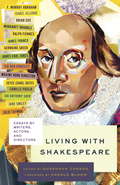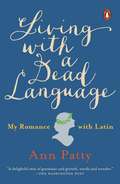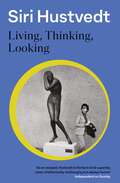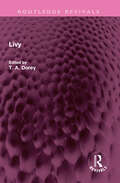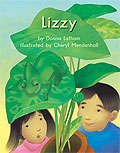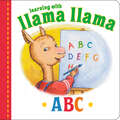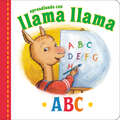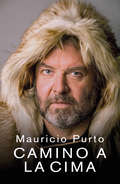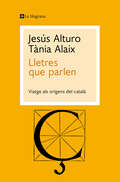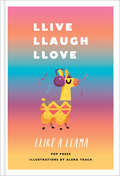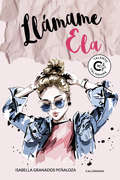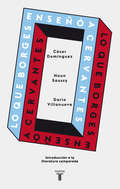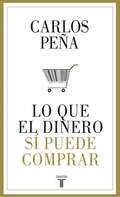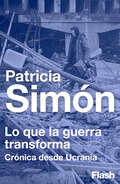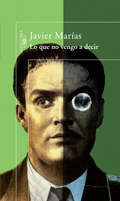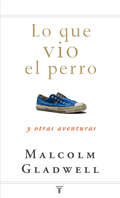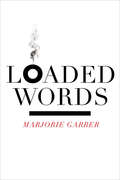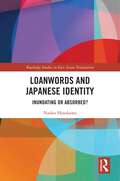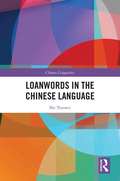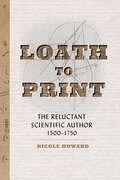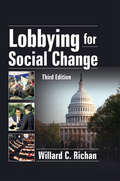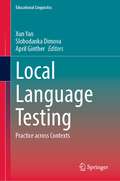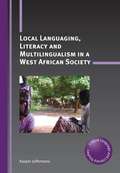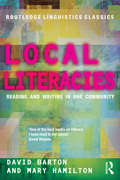- Table View
- List View
Living with Shakespeare: Essays by Writers, Actors, and Directors
by Harold Bloom Susannah CarsonWhy Shakespeare? What explains our continued fascination with his poems and plays? In Living with Shakespeare, Susannah Carson invites forty actors, directors, scholars, and writers to reflect on why his work is still such a vital part of our culture.We hear from James Earl Jones on reclaiming Othello as a tragic hero, Julie Taymor on turning Prospero into Prospera, Camille Paglia on teaching the plays to actors, F. Murray Abraham on gaining an audience's sympathy for Shylock, Sir Ben Kingsley on communicating Shakespeare's ideas through performance, Germaine Greer on the playwright's home life, Dame Harriet Walter on the complexity of his heroines, Brian Cox on social conflict in his time and ours, Jane Smiley on transposing King Lear to Iowa in A Thousand Acres, and Sir Antony Sher on feeling at home in Shakespeare's language. Together these essays provide a fresh appreciation of Shakespeare's works as a living legacy to be read, seen, performed, adapted, revised, wrestled with, and embraced by creative professionals and lay enthusiasts alike.F. Murray Abraham Isabel Allende Cicely Berry Eve Best Eleanor Brown Stanley Cavell Karin Coonrod Brian Cox Peter David Margaret Drabble Dominic Dromgoole David Farr Fiasco Theater Ralph Fiennes Angus Fletcher James Franco Alan Gordon Germaine Greer Barry John James Earl Jones Sir Ben Kingsley Maxine Hong Kingston Rory Kinnear J. D. McClatchy Conor McCreery Tobias Menzies Joyce Carol Oates Camille Paglia James Prosek Richard Scholar Sir Antony Sher Jane Smiley Matt Sturges Julie Taymor Eamonn Walker Dame Harriet Walter Bill Willingham Jess Winfield
Living with a Dead Language: My Romance with Latin
by Ann PattyAn entertaining exploration of the richness and relevance of the Latin language and literature, and an inspiring account of finding renewed purpose through learning something new and challenging After thirty-five years as a book editor in New York City, Ann Patty stopped working and moved to the country. Bored, aimless, and lost in the woods, she hoped to challenge her restless, word-loving brain by beginning a serious study of Latin at local colleges. As she begins to make sense of Latin grammar and syntax, her studies open unexpected windows into her own life. The louche poetry of Catullus calls up her early days in 1970s New York, Lucretius elucidates her intractable drivenness and her attraction to Buddhism, while Ovid's verse conjures a delightful dimension to the flora and fauna that surround her. Women in Roman history, and an ancient tomb inscription give her new understanding and empathy for her tragic, long deceased mother. Finally, Virgil reconciles her to her new life--no longer an urban exile, but a rustic scholar, writer and teacher. Along the way, she meets an impassioned cast of characters: professors, students and classicists outside of academia who keep Latin very much alive. Written with humor, heart, and an infectious enthusiasm for words, Patty's book is an object lesson in how learning and literature can transform the past and lead to an unexpected future.From the Hardcover edition.
Living, Thinking, Looking
by Siri HustvedtFrom the internationally bestselling author of What I Loved and The Summer Without Men, a dazzling collection of essays written with Siri Hustvedt's customary intelligence, wit and ability to convey complex ideas in a clear and lively way. Divided into three sections - Living, which draws on Siri's own life; Thinking, on memory, emotion and the imagination; and Looking, on art and artists - the essays range across the humanities and science as Siri explores how we see, remember, feel and interact with others, what it means to sleep, dream and speak, and what we mean by 'self'. The combination offers a profound and fascinating insight into ourselves as thinking, feeling beings.
Livy (Routledge Revivals)
by Kenneth QuinnFirst published in 1971, Livy is a collection of essays that deals with Livy’s work and its influence on the scholarship of Western Europe. The monumental nature of Livy’s History makes it a source of material for all those interested in the means by which Rome grew into an Imperial power and in the institutions that made her great. Later generations have also sought in Livy’s pages for some magic formula that they could apply to the management of their own cities. The volume includes three chapters on the surviving portions of Livy, one on the history of Livian scholarship in Germany, and – commemorating the Machiavelli quincentenary – one on Livy and Machiavelli. There are also chapters on Livy’s influence on Montesquieu, on the use made of Livy by Macaulay, and on the Florentine Manuscripts of Livy which were such prized possessions in the sixteenth century. This book will be of interest to students of classical literature, history and philosophy.
Lizzy (Fountas & Pinnell LLI Green #Level E, Lesson 76)
by Donna LathamFountas and Pinnell Leveled Literacy Intervention Green System -- 1st Grade
Llama Llama ABC (Llama Llama)
by Anna DewdneyAnna Dewdney's New York Times bestselling series continues with a new Llama Llama board book that takes you from A to Z. A is for alphabetB is for books we read Join Llama Llama as he makes his way from A to Z in this colorful ABC board book illustrated in the classic Anna Dewdney style. From crayons to ice cream to kisses, Llama Llama introduces you to all of his favorite things!
Llama Llama ABC (Llama Llama)
by Anna DewdneyIncluida en la selección de grandes éxitos de The New York Times, la serie narrativa de Anna Dewdney continúa con un nuevo libro ilustrado de Llama Llama que nos lleva de la A a la Z.A es por el alfabeto.B es por los libros que leemos. Comenzando por la A y terminando por la Z, vamos a leer con Llama Llama en este colorido abecedario ilustrado al estilo literario clásico de Anna Dewdney. Desde crayones y helados e incluso besos, Llama Llama nos presenta sus cosas favoritas.
Llegar a la cima
by Mauricio PurtoEl primer chileno en escalar las cumbres más altas de cada continente narra sus increíbles experiencias de vida Tras un grave accidente, Mauricio Purto recuerda las razones que lo llevaron a querer ascender a las cumbres más altas del mundo. Una crónica testimonial apasionada y fascinante que no solo nos lleva a recorrer lugares exóticos y triunfos deportivos, sino que comparte un ejemplo de vida y una búsqueda espiritual.
Lletres que parlen: Viatge als orígens del català
by Jesús Alturo Tània AlaixUna investigació que revolucionarà els orígens del català. Un viatge pels punts clau que han marcat la creació i l’evolució del català parlat i escrit. Des d’una perspectiva interdisciplinària i un rigor científic màxim, els autors ofereixen una visió general i nova sobre els orígens de la llengua catalana i sobre els més antics testimonis escrits que s’han pogut identificar fins ara.Un recorregut que atribueix una nova datació a les còpies manuscrites, d’algunes de les quals s’identifiquen l’autor i l’origen, cosa no assajada mai fins ara. Es proposa una sola traducció —i no dues— al català del Liber iudicum; una tasca duta a terme sota la direcció del jutge de Barcelona Ponç Bonfill Marc; per tant es dóna una nova data del moment de la traducció. El llibre ofereix una primera llista d’escriptors catalans del període preliterari.Un recorregut emocionant que ens farà replantejar els veritables motius de l’aparició del català escrit. En definitiva, una visió totalment nova, exposada de forma planera, i no sense una fina ironia.
Llive, Llaugh, Llove Llike a Llama
by Pop PressWhen life gives you lemons, make llama-nade! This book is an ode to the warm, snuggly llama, our current pop culture obsession.Everything you need to know in llife, you can llearn from a llama. Fluffy, funny-llooking creatures who spit when something bothers them--what's not to llove? Discover 100 encouraging quotes and positive aphorisms alongside llaugh-out-lloud illustrations of these fluffy friends. This is a book of llife llessons, llama-style.
Llámame Ela
by Isabella Granados PeñalozaEl amor de mi vida o mi alma gemela. Ela es hermosa, noble y valiente; un poco autónoma -primero ella, segundo ella, tercero ella y lo que sobre para ella-, el dolor es opcional y el amor una simple elección, a pesar de su irremediable orgullo, el amor la llamará, pero no está en su destino... ¿será?
Lo que Borges le enseñó a Cervantes
by Darío VillanuevaLo que Borges le enseñó a Cervantes es la guía más completa, clara y concisa de literatura comparada. Un texto esencial para los amantes de la Literatura. Lo que Borges le enseñó a Cervantes engloba tanto los debates y cambios teóricos recientes en literatura comparada, como su aplicación práctica. <P><P>El libro analiza también la disciplina en el contexto de la globalización, y en su análisis no deja de lado la comparación con otras artes y medios audiovisuales como el cine. <P><P>Repleto de ejemplos de la literatura hispánica y universal, el libro reúne las claves de una disciplina que cualquier crítico literario o estudiante de literatura necesita conocer, pero abrirá también un mundo nuevo al lector más general, que descubrirá vínculos sorprendentes y una nueva perspectiva desde la que abordar sus lecturas de placer.
Lo que el dinero sí puede comprar
by Carlos PeñaEl nuevo libro de Carlos Peña es un polémico ensayo sobre el crecimiento y la modernización asociados al capitalismo, elementos que han permitido a las clases históricamente más desposeídas lograr un bienestar difícil de cuestionar El crecimiento y la modernización asociados al capitalismo han permitido que las clases históricamente más desposeídas logren un bienestar difícil de cuestionar. Sin embargo, en los últimos años han surgido algunas interrogantes: ¿por qué la prosperidad genera, al mismo tiempo, un creciente rechazo al mercado? ¿De dónde proviene el malestar social que ha exigido un cambio urgente en las relaciones entre la economía y la sociedad? Lo que el dinero sí puede comprar es, también, una contundente réplica a las ideas de Michael Sandel sobre los límites morales del mercado, ofreciendo al lector un controvertido análisis sobre el proceso de modernización capitalista que (afirma Peña en esta reflexión) ha incrementado de manera significativa las condiciones materiales de los chilenos y, a fin de cuentas, sus libertades.
Lo que la guerra transforma: Crónica desde Ucrania
by Patricia SimónUna desgarradora crónica sobre lo que nos ocurre a los civiles cuando lo impensable ocurre y nos vemos envueltos en una guerra. «La guerra es, siempre, morir un poco. Y ninguna paz resucita». El 24 de febrero de 2022, las tropas rusas iniciaron en la frontera con Ucrania una ofensiva militar que cambió el destino del país para siempre. Desde entonces, el conflicto ha generado miles de víctimas mortales, así como la mayor crisis de refugiados en el continente europeo desde la Segunda Guerra Mundial. En esta desgarradora crónica, Patricia Simón se desplaza al territorio para narrar el horror de una guerra que auspicia unas consecuencias devastadoras a escala global. La mirada de Simón es la de los rostros que sufren la masacre en primera persona: los civiles. Y aunque la guerra neutraliza con su miedo y aniquila la posibilidad de identificar humanidad en el enemigo, sus ciudadanos sobreviven improvisando según las circunstancias. Mientras tanto, el periodismo se torna un arma imprescindible en este conflicto para sumar testigos, para dificultar la impunidad y postergar el olvido de una batalla cuyo desenlace está escrito desde hace tiempo.
Lo que no vengo a decir
by Javier MaríasEste volumen recoge noventa y cinco artículos publicados entre febrero de 2007 y febrero de 2009, es decir, el quinto y el sexto año de las colaboraciones de Javier Marías en El País Semanal. Dice el autor en su prólogo: «Llevo ya tantos años dando la tabarra a los lectores que me pregunto cómo me aguantan y cómo aguanto. Por eso, a la hora de escoger un título, me han tentado los de algunas columnas: "El pelma ante los plastas" habría descrito bien una sensación que tengo a menudo al escribir; "Debo preocuparme" habría resultado adecuado, ya que son demasiadas las cosas que no me gustan como para no pensar a veces que el equivocado soy yo, o el anacrónico. Quizás habría valido "El temor de vivir a destiempo", con la salvedad de que no siento temor ante eso; o "Una región ocultamente furibunda", sólo que el adverbio habría estado de más; o "Cuando la gente no tenemos razón", porque no aspiro a tenerla siempre; o "El muy español afán por cargárselo todo", con el inconveniente de que llevo toda la vida padeciendo la acusación de no parecer nada español; o "Dónde huir en secreto", pues ese es el impulso que con frecuenta me asalta». Somos muchos los lectores que, sin embargo, agradecemos que Javier Marías sea un pelma y señale lo que no le gusta; que se atreva a vivir a destiempo y a veces se muestre furibundo; que no aspire a tener razón siempre pero lo procure, que no parezca nada español aunque lo sea, y que no se decida a huir a ningún sitio y nos siga acompañando.
Lo que vio el perro: y otras aventuras
by Malcolm GladwellLos mejores reportajes del autor de los best sellers La clave del éxito y Fueras de serie. Sólo poniéndose en la piel de un perro, pensó Gladwell, podría destapar los secretos de César Millán, el «encantador de perros», capaz de calmar al animal más inquieto o enfurecido con un simple gesto. El ensayo que da título a este libro es un divertido y eficaz ejemplo del método gladwelliano, consistente en «mirar el problema con ojos ajenos». Gladwell nos trae historias de todos los rincones del mundo moderno: investiga las agridulces vidas de genios menores, audaces y obsesivos como el señor Heinz, responsable de que sólo exista un tipo de ketchup frente a docenas de variedades de mostaza; nos revela la trascendencia de la evolución del tinte capilar en la historia del siglo XX; compara los métodos de búsqueda de armas de destrucción masiva con los de detección del cáncer. Autor de tres best sellers que han dado un vuelco a nuestra manera de entender el mundo, Gladwell ha elegido los que consideraba sus mejores artículos, diseminados en distintos números de la mítica revista The New Yorker y nueva muestra de su insaciable curiosidad. Reseñas:«Un libro magnífico que reúne el estilo de escritura que ha hecho de Gladwell la extraordinaria figura que es hoy.»The Guardian «Gladwell es probablemente el mejor exponente de la reciente tendencia de libros que intentan revelarnos los secretos de nuestro complejo mundo a través del prisma de las ciencias sociales.»Financial Times «Algunos capítulos de Lo que vio el perro son obras maestras del arte del ensayo.»The New York Times «Malcolm Gladwell, escritor de éxito masivo, se ha convertido en uno de los grandes especialistas de nuestro tiempo en iluminar las zonas de sombra con su mezcla de periodismo, estudios científicos, historia y filosofía. Amante de llevar la contraria [...] Su objetivo es colocar junto a la certeza un signo de interrogación. [...] Gladwell define su trabajo como "no ficción pop". [...] Es un cheerleader de las ciencias sociales. [...] A la vista de los millones de lectores que han devorado sus libros, cabría decir que hay algo tranquilizador en ver ideas confirmadas por los estudios citados. También es curioso y seductor.»El País Semanal «Un mago en los libros de autoayuda. [...] Con más de 10 millones de ejemplares vendidos, Malcolm Gladwell es uno de los principales escritores "motivacionales", gurú del éxito y analista de "estrategias para triunfar". La clave del éxito, Inteligencia intuitiva, Lo que vio el perro y Fueras de serie son libros que ejecutivos y líderes de todo tipo devoran en los aeropuertos.»La Gaceta de los negocios
Loaded Words
by Marjorie GarberIn Loaded Words the inimitable literary and cultural critic Marjorie Garber invites readers to join her in a rigorous and exuberant exploration of language. What links the pieces included in this vibrant new collection is the author’s contention that all words are inescapably loaded—that is, highly charged, explosive, substantial, intoxicating, fruitful, and overbrimming—and that such loading is what makes language matter.Garber casts her keen eye on terms from knowledge, belief, madness, interruption, genius, and celebrity to humanities, general education, and academia. Included here are an array of stirring essays, from the title piece, with its demonstration of the importance of language to our thinking about the world; to the superb “Mad Lib,” on the concept of madness from Mad magazine to debates between Foucault and Derrida; to pieces on Shakespeare, “the most culturally loaded name of our time,” and the Renaissance.With its wide range of cultural references and engaging style coupled with fresh intellectual inquiry, Loaded Words will draw in and enchant scholars, students, and general readers alike.
Loanwords and Japanese Identity: Inundating or Absorbed? (Routledge Studies In East Asian Translation Ser.)
by Naoko HosokawaLoanwords and Japanese Identity: Inundating or Absorbed? provides an in-depth examination of public discussions on lexical borrowing in the Japanese language. The main objective of this book is to explore the relationship between language and identity through an analysis of public attitudes towards foreign loanwords in contemporary Japanese society. In particular, the book uncovers the process by which language is conceived of as a symbol of national identity by examining an animated newspaper controversy over the use of foreign loanwords. The book concludes that the fierce debate over the use of loanwords can be understood as a particular manifestation of the ongoing (re-)negotiation of Japanese national identity. This book will appeal to scholars and students in sociolinguistics, translation studies, and discourse analysis, while its cultural and geographic focus will attract readers in Japanese studies and East Asian studies.
Loanwords in the Chinese Language (Chinese Linguistics)
by Shi YouweiA loanword, or wailaici, is a word with similar meaning and phonetic form to a word from a foreign language that has been naturalized in the recipient language. From ancient times, cultural exchanges between China and other countries has brought and integrated a myriad of loanwords to the Chinese language. Approaching the topic from a diachronic perspective, this volume is the first book-length work to chart the developmental trajectory, features, functions, and categories of loanwords into Chinese. Beginning with a general introduction to the Chinese loanword system, the author delves deeper to explore trends and standardization in Chinese loanword studies and the research landscape of contemporary loanword studies more generally. Combining theoretical reflections with real-life examples of Chinese loanwords, the author discusses not only long-established examples from the dictionary but also a great number of significant loanwords adopted in the 21st century. The author shows how the complexity of the Chinese loanword system is intertwined with the intricacies of the Chinese character system. This title will be an essential reference for students, scholars, and general readers who are interested in Chinese loanwords, linguistics, and language and culture.
Loath to Print: The Reluctant Scientific Author, 1500–1750
by Nicole HowardWhy did so many early modern scientific authors dislike and distrust the printing press?While there is no denying the importance of the printing press to the scientific and medical advances of the early modern era, a closer look at authorial attitudes toward this technology refutes simplistic interpretations of how print was viewed at the time. Rather than embracing the press, scientific authors often disliked and distrusted it. In many cases, they sought to avoid putting their work into print altogether. In Loath to Print, Nicole Howard takes a fresh look at early modern printing technology from the perspective of the natural philosophers and physicians who relied on it to share ideas. She offers a new perspective on scientific publishing in the early modern period, one that turns the celebration of print on its head. Exploring both these scholars' attitudes and their strategies for navigating the publishing world, Howard argues that scientists had many concerns, including the potential for errors to be introduced into their works by printers, the prospect of having their work pirated, and most worrisome, the likelihood that their works would be misunderstood by an audience ill-prepared to negotiate the complexities of the ideas, particularly those that were mathematical or philosophical. Revealing how these concerns led authors in the sciences to develop strategies for controlling, circumventing, or altogether avoiding the broad readership that print afforded, Loath to Print explains how quickly a gap opened between those with scientific knowledge and a lay public—and how such a gap persists today. Scholars of the early modern period and the history of the book, as well as those interested in communication and technology studies, will find this an accessible and engaging look at the complexities of sharing scientific ideas in this rich period.
Lobbying for Social Change
by Willard C. RichanThis step-by-step guide to lobbying covers it all-from the basics for beginners to specific techniques for experienced lobbyists"You and I may never achieve major public office, but we do not need to in order to affect public policy."-Author Willard C. RichanTo effect social change, any lobbyist&’s case must be presented with skill, knowledge, and confidence. This reader-friendly book shows the way. It assumes no prior knowledge of the subject and provides the nuts and bolts of public policy advocacy (lobbying) in non-technical language. Lobbying for Social Change, Third Edition is organized in a way that easily lends itself to use in the classroom as well as by individual or group advocates, and it is packed with clearly presented case material that illustrates the lobbying process in action. This new edition provides updated case material, expanded coverage of electronic media, and two new chapters; one focusing on direct action for fundamental change, and the other presenting a case history of a grassroots lobbying campaign.Part I of Lobbying for Social Change, Third Edition, entitled "The Basics," will show you how to: assess your political resources set an agenda for action understand whom to lobby-and how to gauge their power, motivation, and ability to effect or impede social change gather and use evidence to support your positionPart II, "Practical Applications," gives you nuts-and-bolts information about how lobbying is done. You&’ll learn: how to work directly with policymakers-face-to-face, by mail, by telephone, etc. effective rules for to testifying in a public hearing how to make use of the mass media-writing news releases, participating in panel discussions, what to do when being interviewed (and how to increase your chances of being a repeat guest on talk and news shows), and how to effectively work with print and electronic media, including the Internet ways to take on the system through direct actionPart III, "Case History of a Grassroots Lobbying Campaign," takes you inside an actual campaign (in this case, to amend the impending-at the time-welfare reform bill). You&’ll see how a group of five Philadelphia area social workers and one feminist activist started the Delaware County Coalition to Save Our Safety Net-a coalition that would make a substantial impact on the specifics of welfare in the state of Pennsylvania.This new edition of the classic manual for lobbyists is packed with vital information for lobbying in the new millennium. We urge you to consider making it a part of your personal or teaching collection today!
Local Journalism and Local Media: Making the Local News
by Bob FranklinThe local media - local newspapers and radio, regional television, cable television and local news on the internet - represents a diverse and rapidly-changing sector of the British media landscape. Bringing together media academics, local journalists and other media professionals, this text presents a thorough, up-to-date and authoritative account of recent developments and future prospects for Britain's local newspapers, local media and local journalism. Drawing on current research and relevant literature, the book covers: *key developments in the local media scene*the distinctive editorial format of local newspapers*news sources and other sources available to local journalists*recent developments in media policy*online journalism*ethics and regulations*the impact of new technology. Situating the study within the context of local, national and multi-national media networks, this unique text provides students with a well-written and wide-ranging assessment of all aspects of the local media in the UK and as such, will be a welcome addition to the current literature.
Local Language Testing: Practice across Contexts (Educational Linguistics #61)
by April Ginther Slobodanka Dimova Xun YanThis book describes language testing practices that exist in the intermediate space between large-scale standardized testing and classroom assessment, an area that is rarely addressed in language testing literature. Drawing empirical research on a variety of languages, the volume discusses local language tests’ ability to represent local contexts and values, explicitly and purposefully embed test results within instructional practice, and provide data for program evaluation and research. Although local testing practices have been grounded in the theoretical principles of language testing, the authors in this volume supplement the theoretical content with practical examples of how local tests can be designed to effectively function within and across different institutional contexts.
Local Languaging, Literacy and Multilingualism in a West African Society
by Kasper JuffermansThis book aims to enhance and challenge our understanding of language and literacy as social practice against the background of heightened globalisation. Juffermans presents an ethnographic study of the linguistic landscape of The Gambia, arguing that language should be conceptualised as a verb (languaging) rather than a countable noun (a language, languages). He goes on to argue that sociolinguistics should not be defined as the study of 'who speaks what language to whom, and when and to what end' (as Fishman defined it), but as the study of who uses which linguistic features under particular circumstances in a particular place and time. The book is therefore in part an exercise to unpluralise language, which Juffermans argues is necessary for a more realistic understanding of what language is, what it does, and what people do with it. The book will be of interest to sociolinguistics researchers, especially those focusing on Africa and the global South.
Local Literacies: Reading and Writing in One Community (Routledge Linguistics Classics)
by David Barton Mary HamiltonLocal Literacies is a unique detailed study of the role of reading and writing in people’s everyday lives. By concentrating on a selection of people in a particular community in Lancaster, England, the authors analyse how they use literacy in their day-to-day lives. It follows four people in detail examining how they use local media, their participation in public life, the role of literacy in family activities and in leisure pursuits. Links are made between everyday learning and education. The study is based on an ethnographic approach to studying everyday activities and is framed in the theory of literacy as a social practice. This Routledge Linguistics Classic includes a new foreword by Deborah Brandt and a new framing chapter, in which David Barton and Mary Hamilton look at the connections between local and global activities, interfaces with institutional literacies, and the growing significance of digital literacies in everyday life. A seminal text, Local Literacies provides an explicit usable methodology for both teachers and researchers, and clear theorising around a set of six propositions. Clearly written and engaging, this is a deeply absorbing study and is essential reading for all those involved in literacy and literacy education.
